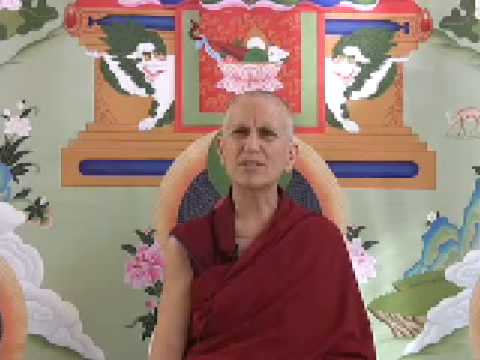Fear of being disliked
A series of talks on the many aspects of of our lives that we may have fear towards—death, identity, the future, health, the economy, loss, separation, and more; touching also on the wisdom of fear and the different antidotes to ease our fears.
- We create incredible fear based on what people think of us
- If people don’t like us, that’s good for us, makes us humble
- Attachment to reputation is a source of much suffering
- Seeing and acknowledging our own faults is a good practice
Fear 15: Fear of people not liking us (download)
So another kind of fear that we often have is fear of people not liking us. And, in fact when we had the go-around, was it before the last EML? [Exploring Monastic Life] When we asked people what their fears were, their main fear was that they wouldn’t fit in the group, or other people wouldn’t like them, or they’d be asked to leave, or something like that. So we all have this incredible fear that somehow we’re not going to be good enough and we’re going to be rejected or abandoned or something, you know. Our reputation is going to suffer, basically. Okay? And so again, we can get ourselves all worked up about this fear and imagine all kinds of worst case scenarios and convince ourselves that they’re going to happen and make ourselves always feel very insecure and worried and anxious and so on.
But what I find very helpful when my mind gets attached to reputation like that is to say: “Well, if people don’t like me, that’s good for me.” Wow!, how’s that good for you? Well, it makes us a little bit more humble, doesn’t it? You know, if people notice our faults and point them out or something like that, it makes us more humble. And so, for some of us who begin to get a little bit too inflated about all of our good qualities, instead of worrying about somebody seeing our faults, just recognize that we have them and of course people will see them. And if they see them, it’s actually okay, because it will make us more humble which will do us some good. So that one is one thing I find helpful. You know, so instead of being afraid, I just say; “If it happens, it’s going to be good for me.”
A second thing is to ask myself, because here the fear of bad reputation is linked to be attached to having a good one, is to ask myself: “What good does a good reputation do?” Okay? It doesn’t create any good karma, it doesn’t give me a precious human life, it doesn’t prevent me from getting old, sick and dying, it doesn’t get me closer to enlightenment, it doesn’t help me to meet teachers. What good does having a good reputation do? You know? And so when I really ask myself, according to what my values are, what I consider important in my life, how having a good reputation will help me accomplish what I consider valuable. Usually a good reputation doesn’t help at all. It doesn’t do anything to accomplish what’s really valuable because what’s really valuable for me, I have to accomplish within here myself. Okay? So that also helps to really let go of all that fear of losing my reputation.
And I think also, you know, instead of being so afraid about other people seeing our bad qualities and then feeling so hurt when they do see them, because they’re not supposed to see them after all, is kind of a good practice, I think, for us to be able to even declare what our faults are. Not that we have to go around and, in some kind of self-deprecating way, just constantly tell people all of our mistakes and our faults and hint for them to tell us that, no, it’s not true, that we’re really good. I’m not talking about that, okay? What I’m talking about is when we have this fear of attachment to reputation, you know, of fear of losing our reputation, then to actually begin to declare our own mistakes and our own shortcomings, as a way just of defusing the whole situation, you know? Because if we can talk about these things, they’re not going to be nearly as bad as if we’re trying to keep them covered up. And, you know, sometimes in the covering up of something, we make the situation a lot worse. And Bill Clinton can tell you all about that. Okay, so it’s much easier sometimes just to be frank about it and forget about the reputation, and then actually sometimes people respect us more if we are able to talk about our own mistakes or shortcomings. Okay?
And so, all of this helps us to relax the fear of criticism, the fear of having a bad reputation.
Venerable Thubten Chodron
Venerable Chodron emphasizes the practical application of Buddha’s teachings in our daily lives and is especially skilled at explaining them in ways easily understood and practiced by Westerners. She is well known for her warm, humorous, and lucid teachings. She was ordained as a Buddhist nun in 1977 by Kyabje Ling Rinpoche in Dharamsala, India, and in 1986 she received bhikshuni (full) ordination in Taiwan. Read her full bio.


